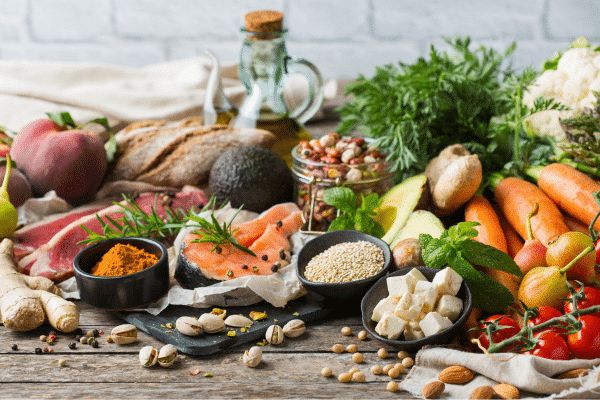For many people, taking care of their eyesight is all about reading in the right light, keeping their eyes at a safe distance from the TV or computer, and getting regular eye exams. Of course, all this matters. However, not everyone knows that proper vision is also greatly influenced by diet. What to eat to improve eyesight? The answer can be found below.
Diet for the eyes - essential vitamins
If you want to maintain good eyesight, you should not only have your eyes regularly examined by an ophthalmologist, but also ensure an adequate supply of specific vitamins in your diet. Important for proper vision in the first place are:
- Beta carotene - converts to vitamin A in the body - fights free radicals that damage vision. In addition, it plays an important role in the proper functioning of the photoreceptors of the retina, responsible for vision during the day and after dark. Its deficiencies can lead to, among other things. to the so-called. Chicken blindness or dry eye syndrome. Beta carotene can be found, for example, in carrots, tomatoes, spinach, broccoli, red peppers, pumpkin, sorrel, apricots, mangoes. It is also not lacking in fish, liver and fatty milk.
- Vitamin C - It is needed in the synthesis of collagen, which ensures the proper durability of the blood vessels of the eyes. Its deficiency can cause fragility of conjunctival blood vessels, and thus lead to hemorrhages and subconjunctival hemorrhages that can damage vision. Foods rich in vitamin C include red peppers, citrus fruits, kiwis, grapes, currants and potatoes.
- Vitamin E - protects beneficial fatty acids from oxidation, ensures the integrity of cell membranes and increases the absorption of beta carotene. It can be found in dairy, meat, broccoli, carrots, soybeans and nuts.
What to eat to improve eyesight - minerals are important
Many patients wonder what else to eat to improve vision. In addition to vitamins, minerals play a very important role, especially among them:
- Zinc - participates in the production of rhodopsin, thanks to which a person is able to distinguish shades of gray and see at dusk. It also enhances the action of free radical-fighting enzymes and allows liver stores of vitamin A to be consumed. Foods rich in zinc include beans, peas, seafood, buckwheat groats, meat and fish.
- Selenium - reduces free radicals that damage vision. It can be found among others. In corn, fish, maple syrup, nuts.
- Copper - maintains collagen bonds thereby increasing the durability of blood vessels in the eyes and reduces harmful free radicals. Foods high in copper include: cocoa, sunflower seeds, pumpkin seeds, hazelnuts.
- Manganese - also helps fight free radicals that adversely affect vision. Good sources of manganese include oatmeal, brown rice, almonds, chickpeas, millet, buckwheat and barley groats, dark chocolate, peanuts and walnuts.
Healthy fats for healthy eyes
Fats are also an essential part of a balanced diet. Which fats enhance eyesight? First of all, polyunsaturated fatty acids:
- Omega-3 - alleviate the symptoms of dry eye, protect against diseases such as glaucoma - lowering intraocular pressure. Products with a high content of omega-3 fatty acids are primarily fish-derived oils, marine algae oils and marine and freshwater fish. Of the latter, fresh salmon, sardines in oil, smoked mackerel and herring - salted and smoked, farmed carp and trout are certainly worth including in the diet. Vegetable products rich in omega-3 fatty acids include: vegetable oils (flax, canola, soybean, olive oil) and flaxseed, walnuts and chia seeds.
- Omega-6 - have similar effects on vision as omega-3 acids. They can be found in products of plant origin, for example, in fats - corn oil, sunflower oil, soybean oil, rapeseed oil, coconut oil, grape seed oil. They are also present in sesame, almonds, peanuts, pumpkin and sunflower seeds and avocados.
It should be noted that the ratio of omega-3 to omega-6 acids should be as low as possible, which means that omega-3 acids are more important in the diet.
Anthocyanins and carotenoids
In addition to vitamins, minerals and polyunsaturated fats are also very beneficial for vision:
- Anthocyanins - natural, water-soluble pigments that protect blood vessels, improve blood flow and stimulate rhodopsin production. In addition, they have anti-inflammatory and antibacterial properties. Products high in anthocyanins include blueberries, strawberries, grapes, cherries and red cabbage.
- Carotenoids - especially lutein and zeaxanthin - reduce the risk of diseases such as cataracts and macular degeneration. Lutein and zeaxanthin are powerful antioxidants that are part of the macular pigment - they protect the retina from free radical damage and blue light. Rich sources of lutein are green vegetables such as kale, savoy cabbage, parsley, spinach, chives, peppers, pumpkin. To supplement lutein and maintain healthy eyes, it's also worth eating fruits - blueberries and bilberries (blueberries, bilberries), raspberries, currants and blackberries. Sources of zeaxanthin, on the other hand, include Brussels sprouts, broccoli, corn and tomatoes.
In addition to knowing what to eat to improve eyesight, it is worth paying attention to the origin of the products mentioned. To make sure that the products we buy contain the desired ingredients, it is a good idea to choose high-quality organic foods from certified producers.

